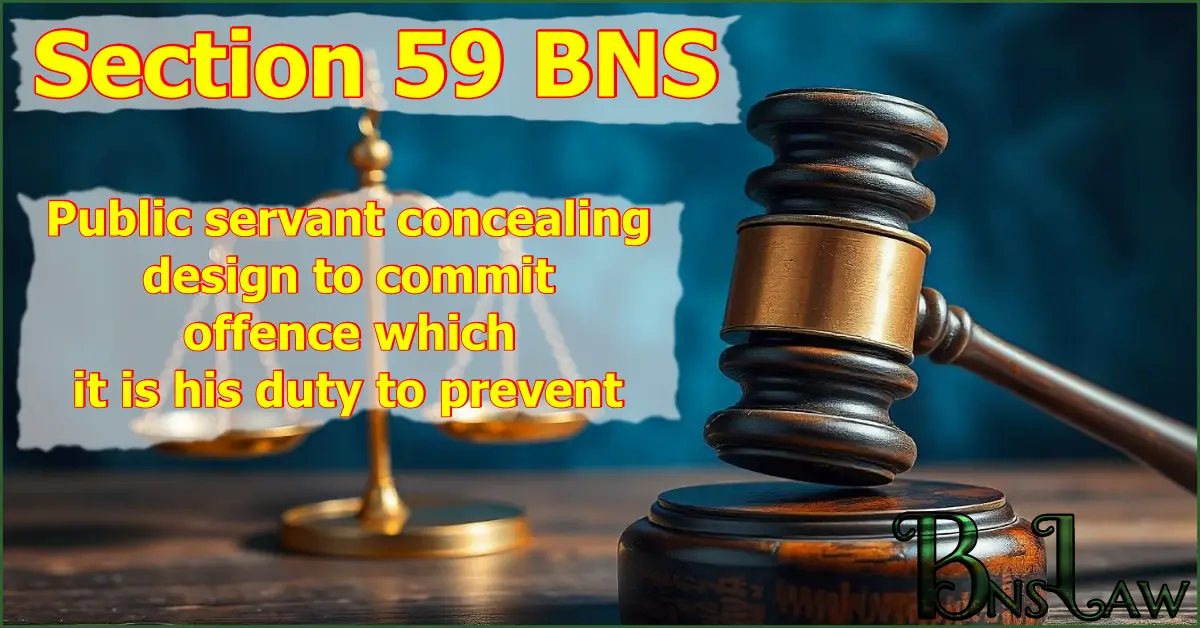Section 59 BNS | BNS 59
Whoever, being a public servant, intending to facilitate or knowing it to be likely that he will thereby facilitate the commission of an offence which it is his duty as such public servant to prevent, voluntarily conceals, by any act or omission or by the use of encryption or any other information hiding tool, the existence of a design to commit such offence, or makes any representation which he knows to be false respecting such design shall,—
(a) if the offence be committed, be punished with imprisonment of any description provided for the offence, for a term which may extend to one-half of the longest term of such imprisonment, or with such fine as is provided for that offence, or with both; or
(b) if the offence be punishable with death or imprisonment for life, with imprisonment of either description for a term which may extend to ten years; or
(c) if the offence be not committed, shall be punished with imprisonment of any description provided for the offence for a term which may extend to one-fourth part of the longest term of such imprisonment or with such fine as is provided for the offence, or with both.
Illustration
A, an officer of police, being legally bound to give information of all designs to commit robbery which may come to his knowledge, and knowing that B designs to commit robbery, omits to give such information, with intent to so facilitate the commission of that offence.
Here A has by an illegal omission concealed the existence of B’s design, and is liable to punishment according to the provision of this section.
READ OTHER SECTIONS OF CHAPTER IV — OF ABETMENT, CRIMINAL CONSPIRACY AND ATTEMPT
FAQs of BNS Section 59
-
59 BNS punishment and fine
Punishment and fine under Section 59 of the BNS—
59(a): Imprisonment extending to one-half of the longest term provided for the offence, or fine, or both.
59(b): Imprisonment for 10 years.
59(c): Imprisonment extending to onefourth of the longest term provided for the offence, or fine, or both. -
59 BNS cognizable or not
According as offence abetted is cognizable or non-cognizable.
-
59 BNS bailable or not
The offences under Sections 59 of the BNS—
59(a): According as offence abetted is bailable or non-bailable.
59(b): Non-bailable.
59(c): Bailable. -
59 BNS trial court
Court by which offence abetted is triable.
Important Points
- Cognizable Offences: These are offences where a police officer can arrest a person without a warrant.
- Non-Cognizable Offences: These are offences where a police officer cannot arrest a person without a warrant.
- Bailable Offences: These are offences where the accused can get bail from the police station itself. All bailable offences are listed in the First Schedule of the Bharatiya Nagarik Suraksha Sanhita (BNSS).
- Non-Bailable Offences: Offences in which bail is not granted directly from the police station but after hearing the case in the court, the judge decides when bail will be granted. All non-bailable offences are listed in the first schedule of the Bharatiya Nagarik Suraksha Sanhita (BNSS).
- In the above FAQ, “trial court” means the court that has jurisdiction to try the offence.
- In the above FAQ, the expression “Magistrate of the first class” and “Any Magistrate” does not include Executive Magistrates.
Read other Sections of the BNS
Reference Link: New Criminal Laws (BNS), Ministry of Home Affairs







